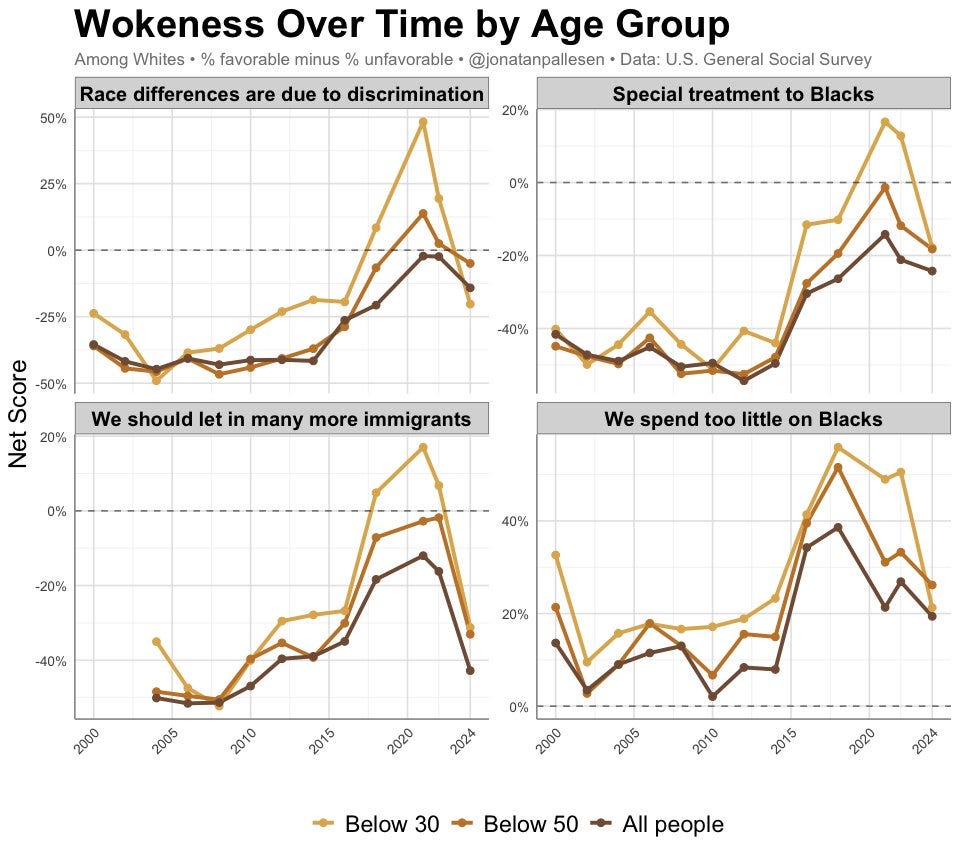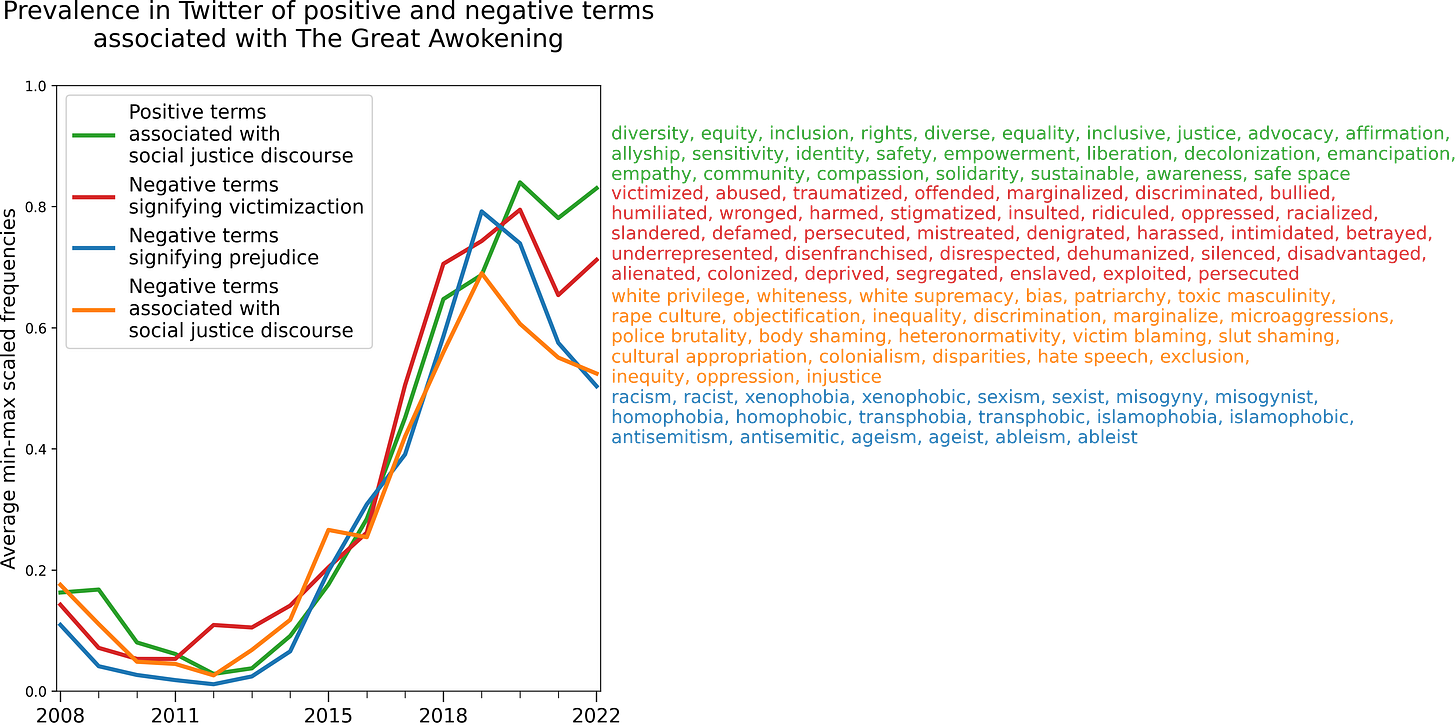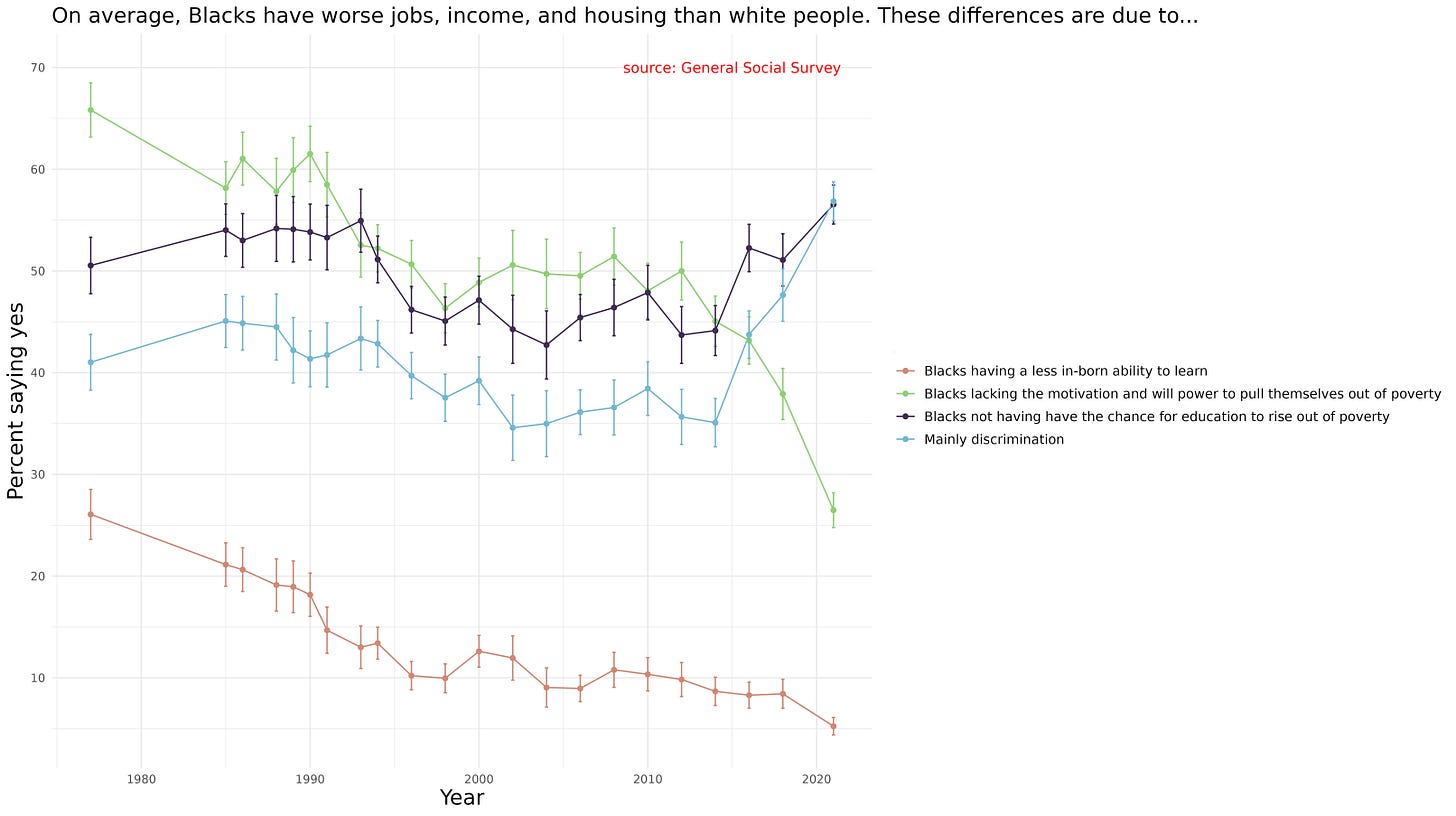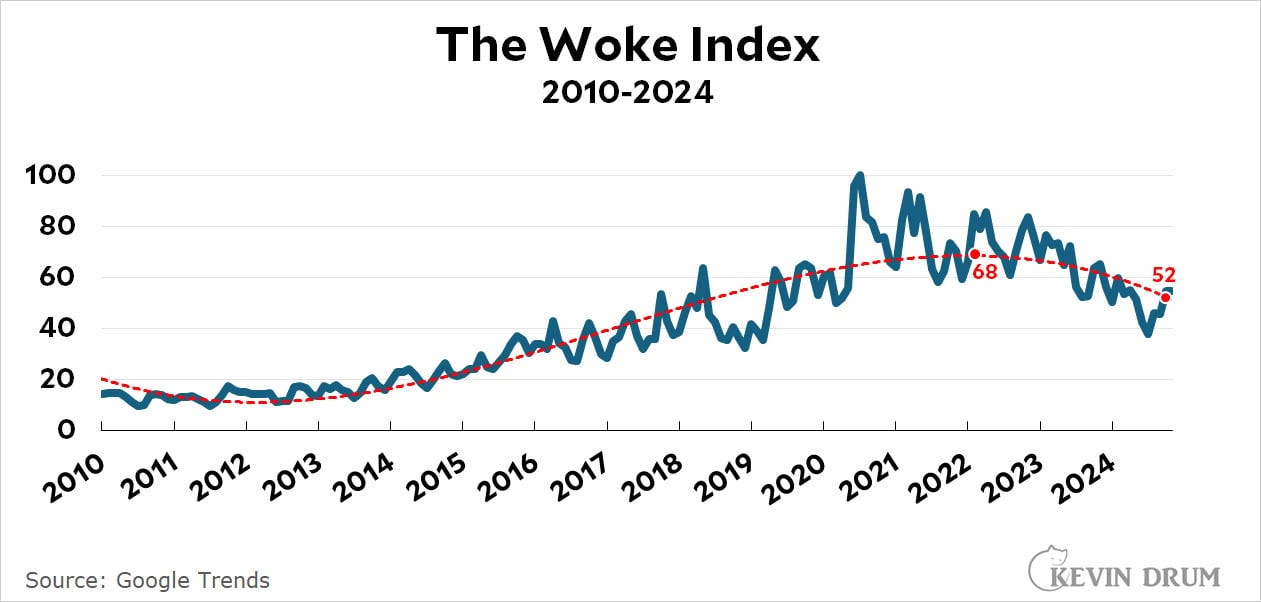It’s official: wokeism is receding.

The shifts are quite dramatic, especially for supporting immigration. Previously, I was skeptical of whether the decline of wokeness was even real, and argued that the decline was an artefact of the movement becoming more positive:

The reading of the chart is correct, but the error lies in the interpretation: positivity and negativity are not different sides of the same coin, as negativity motivates people more than positivity does.
As for what caused the decline, I can decisively say that the cause is not people becoming more hereditarian in their views — the percentage of people who think that blacks have worse jobs/income/housing due to differences in innate intelligence is 7.5%1 in the 2024 wave, just below the historical average.

People became a bit more friendly towards the Republican party in 20242, but the shift was far too small (0.1 on a 7 point scale) to explain the massive changes that occured. The COVID pandemic did shift a lot of people to the right or more extreme political spaces, but the event was too disconnected from race to seem like a plausible candidate.
I have a different theory: social movements, especially in the short term, are motivated by rewards and victories more than ideas. The first big victory of the third awokening, gay marriage, energized the movement and made them push harder. They haven’t accmplished anything of value since then, so the movement naturally lost its energy and receded.
A lot of cultural victories were achieved: new holidays (Pride month and Juneteenth), increased diversity in media, normalization of pronouns, and the removal of confederate memorabilia, but all of these victories are vacuous and superficial.
What the woke has wanted for the past 70 years is equality in status between races and less racism in society. Explicit racism and discrimination are much less common than they used to be in the past, and implicit racism as well — self-deception exists but it isn’t perfect. The differences in markers of status like education and income have been pretty stagnant for the last 100 years:

It’s impossible to change the existence of the racial differences because they are genetically caused. Racism can be culturally surpressed, but it cannot be truly eliminated; the existence of racial differences, neuroticism as a personality trait, and the fact that conflict theory is true3 make it so that some fraction of the population will always be racist.
30 year cycle theory
Matthias Gisslar, an unknown academic, theorizes that wokeness strikes every 30 years — first in 1954-19684 with the civil rights movement, next in 1980-19955 with political correctness, and then in 2012-20246 with wokeness. Eric Kaufmann dismisses this as a just-so story, but I think it’s consistent with a model where wokeness is motivated by the youth and enabled by the elderly: the movement has a goal, tries to achieve it, and then the youth realize the fundamental problem is not getting solved, get demotivated, and move on. The next generation of youth are not aware of what happened in the last generation, or think this time might be different, and agitate for more change.
One could dismiss the notion that the civil rights movement or even the political correctness movements were woke, or contend that wokeness doesn’t really exist7. All of these movements are motivated by the same thing: the idea that differences in markers of social status between groups are caused by environmental or social factors that can be changed. Civil rights wanted to eliminate the status gaps using the law, political correctness wanted to equate people using language, and wokeness wanted to eliminate the gaps using culture.
Thus, the obvious prediction to make is that wokeness will strike back. My guess is that the future woke movement will focus on immigration, racism/speech on the internet, AI bias, climate change, keeping women’s rights safe, and reparations; the legal and cultural battles have already been fought and nothing happened. The second prediction is that woke beliefs will not go away, interracial marriage and civil rights only got more popular after they were nationalized, and political correctness never really left.
Why wokism exists8 in the first place isn’t really relevant with regard to whether it will come back in the future:
If the cause is civil rights, then it’s likely that it will come back because civil rights are extremely popular and unlikely to be overturned, despite years of high quality legal and political criticism of the law. (Edit: Richard Hanania has a different perspective: "the Trump administration has done a lot to change civil rights law, which used to always move in a left-wing direction under both administrations. If wokeness is civil rights law, then it is a problem that is in the process of being solved.”).
If the cause is egalitarian morality + group differences + belief in the blank slate, then there is nothing to do.
If the cause is mutations, then things are going to get interesting: maybe teenagers with mutations that code for supporting pedophilia will start popping up in the 40s and cause the age of consent to be eliminated.
If the cause is critical theory, philosophy, and the long march through institutions, then we will be fine if we just engage in discourse and bring out the arguments.
If the cause is signalling theory, then we are screwed as long as there are discrete races in the elite.
I do think that the next wave might be the last time, after that I think that people might give up; perhaps racially hereditarian attitudes will stop being as rare as they are, or people might get concerned with more salient issues like the pension system, birth rates, energy use, adapting the education system to the AI world, and (maybe) dysgenics.
Conflict theory: political failure is because of groups fighting over outcomes (usually zero sum), mistake theory: political failure is because of errors in conception and implementation to change outcomes (usually positive sum). Here is Scott Alexander’s explanation of the theories and why he doesn’t believe in conflict theory. My refutation of Scott will have to come later, but I think that observed reality (e.g. demographic differences in voting, discourse) suggests that most modern political disputes are due to conflict between groups or values.
Nothing really exists. Models are models. Words are words. If they get used, then there is always something behind the smoke and mirrors, even if it’s just more smoke and mirrors.
Causal reasoning, especially when dealing with complex problems like these, is always iffy, but I lean towards the signalling theory of wokism and the civil rights theory. Philosophy, (just) egalitarian morality, the jews, and dysgenics all seem like silly explanations.








Postmodernist internal logic leans towards cyclical models for the same exact reasons, though they seem to prefer a 10 year model.
At least in the case of Japan, leftist activism peaked in 1949, 1960, 1968, 1980 (sort of), and 1989.
"If the cause is civil rights, then it’s likely that it will come back because civil rights are extremely popular and unlikely to be overturned, despite years of high quality legal and political criticism of the law."
No, the Trump administration has done a lot to change civil rights law, which used to always move in a left-wing direction under both administrations. If wokeness is civil rights law, then it is a problem that is in the process of being solved.
Also, the "cycle" theory here is discussed in my book too.